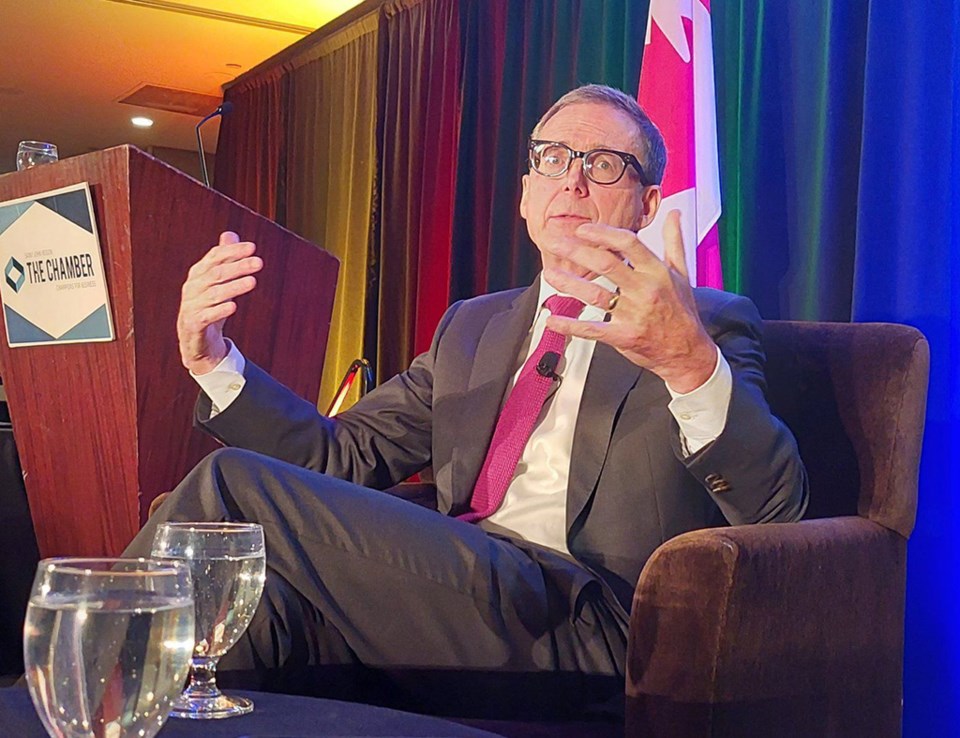SAINT JOHN, N.B. — Tiff Macklem says he understands the pain Canadians are going through.
The Bank of Canada governor told a business audience in Saint John last week that he knows high inflation has been hard on people, and that the higher interest rates he and his organization have imposed are bitter medicine. And yet, he says it's much too early to slash the policy interest rate, despite data released the day before that showed the rising cost of living had cooled in October.
Nor will Macklem slag the Trudeau Liberal government in Ottawa for big spending, which arguably has contributed to the highest inflation in generations, saying it's important for his office to remain politically neutral.
His speech on Wednesday at a business luncheon put on by the Saint John Region Chamber of Commerce at the Delta Hotel was a plea for patience and a defence of what the governor called the bank's forceful strategy.
"High inflation has made life hard," Macklem said, citing the bank's most recent consumer survey that showed nine out 10 people are unhappy with the situation, along with letters and emails from upset Canadians. "I hear the worry, the frustration, even the desperation in these letters. I also hear from businesses that are being squeezed by higher costs and from workers who need higher wages to keep up with the rising cost of living."
The bank's rate now stands at five per cent, a 22-year high. It's risen remarkably from just 0.25 per cent less than two years ago, pushing borrowing costs way up for everything from a house to a vehicle.
Canadian inflation has come down from its peak of 8.1 per cent, and the latest report on Tuesday showed it at 3.1 per cent year over year, down from 3.8 per cent in September. The situation was even better in New Brunswick, with inflation at 2.8 per cent. But during a question and answer session with the audience and speaking at a press conference afterwards, Macklem warned that one or two months of lower prices doesn't make for a trend. He said he'd like to see inflation consistently within the target range of between one and three per cent before cutting the rate.
He also recounted growing up as a teenager in the 1970s, when inflation became entrenched and he had the impression everyone was angry. Policy-makers at the time tried price and wage controls and slowing the growth of the money supply. None of it worked. He said Ottawa and the central bank weren't willing to stay the course by restraining government spending and tightening monetary policy enough.
"If high inflation persists, we are prepared to raise our policy rate further."
Only historically high interest rates and a deep recession broke the vicious cycle, with the policy rate hitting 21 per cent in 1981 and mortgage rates going through the roof. By 1982, the unemployment rate hit 13.1 per cent, more than double what it is today.
"This time around we responded forcefully to high inflation from the start and are resolute in our commitment to complete the job," Macklem told the well-dressed crowd who had just eaten a turkey and gravy lunch. "This tightening of monetary policy is working, and interest rates may now be restrictive enough to get us back to price stability. But if high inflation persists, we are prepared to raise our policy rate further."
Macklem was careful choosing his words when Brunswick News asked at the press conference whether Justin Trudeau's Liberal government was repeating the same high spending mistakes his father, Pierre Trudeau, made when he was prime minister in the 1970s. Ottawa's latest economic update, released Tuesday, projects a deficit of $40 billion.
"I'm not going to comment on the specific fiscal measures, a running commentary on federal and provincial economic updates. I don't think that's helpful for the Bank of Canada's independence. It's not really our job and there's a lot of people who can comment on fiscal policy."
However, Macklem said the fall fiscal update showed that the scales had changed little since the spring budget.
"The fall economic statement suggests that the government is not adding new or additional inflationary pressures over the next couple of years, which is the critical period over which we will be looking to reduce inflation and get it back to target."




